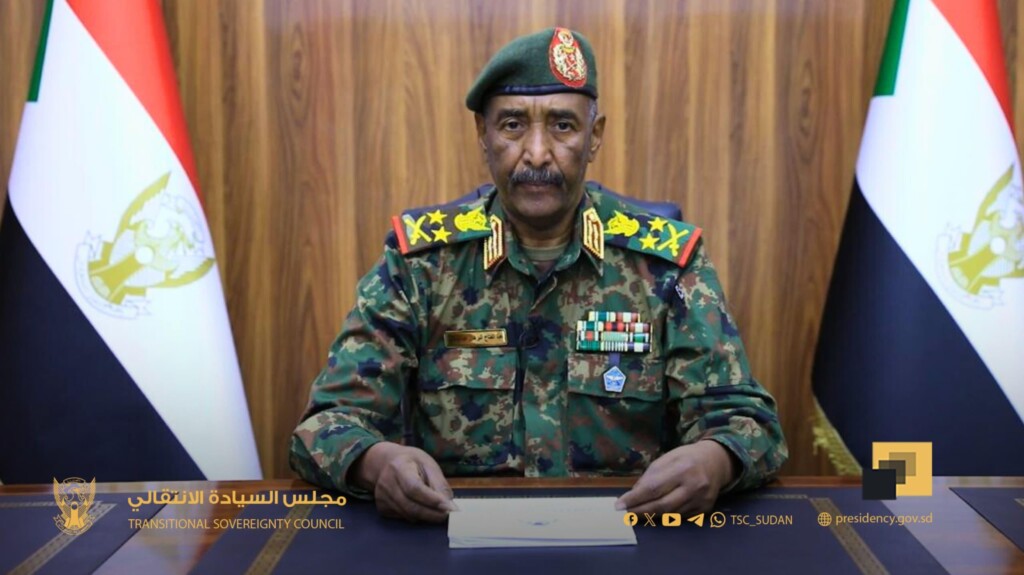Sudan govt forms committee to probe US chemical weapons allegations

The President of Sudan’s Transitional Sovereignty Council (TSC), Commander-in-Chief of the Armed Forces, Lt Gen General Abdelfattah El Burhan (File photo: SUNA)
Head of the Sovereignty Council and Commander-in-chief of the Sudanese Armed Forces (SAF), Lt Gen Abdelfattah El Burhan, announced the formation of a national committee to investigate the US’s accusations that the SAF used chemical weapons during the country’s ongoing war.
The decision, issued by El Burhan and stated in a press release by the Ministry of Foreign Affairs on Thursday, comes in response to US State Department’s sanctions on Sudan after determining the government violated the Chemical Weapons Convention, citing alleged chlorine gas attacks by the SAF in 2024.
The new investigative committee will include representatives from the Ministry of Foreign Affairs, the Ministry of Defence, and the General Intelligence Service. The group has been tasked with submitting its findings “immediately”.
The Foreign Ministry said the decision reflects Sudan’s commitment to international treaties, including the Convention on the Prohibition of Chemical Weapons. It also stressed Khartoum’s transparency and its firm rejection of what it called baseless accusations from Washington.
Last week, both the Ministry of Foreign Affairs and the Ministry of Culture and Information condemned the US sanctions in separate statements. Minister of Culture and Information Khaled Aleiser dismissed the accusations as “political blackmail and falsification of the facts,” and insisted that they were not based on evidence.
Mixed reactions
Sumoud led by former Prime Minister Abdalla Hamdok, called for an independent international committee to investigate all crimes and violations committed during the war, including allegations of chemical weapons use by the army.
The leader of the Sudan People’s Liberation Movement Revolutionary Democratic Current (SPLM-RDC), Yasser Arman, advocated for sanctions targeting individuals and institutions rather than the state.
Darfur Governor Minni Arko Minawi called for a credible investigation into the US allegations.
The Sudan People’s Liberation Movement-North (SPLM-N), led by Abdelaziz El Hilu, accused the SAF of deploying internationally banned chemical agents, most notably mustard gas and lewisite. an organoarsenic compound, against unarmed civilians.
The SPLM-N, which is part of Tasees (Sudan Founding Alliance), which formed following the controversial Nairobi Conference, and includes the paramilitary Rapid Support Forces (RSF) and allied factions, said in a statement seen, that photos and videos documented chemical clouds in Jebel Moya, Dinder, Karari, and East Nile.
It also referenced lab tests of samples containing arsenic, the active agent in lewisite, and eyewitness accounts from victims who suffered symptoms consistent with chemical exposure, including unexplained physical collapse.
The group cited confidential medical reports pointing to internal burns, lung corrosion, and slow death caused by internal asphyxiation.
Tasees said the US decision confirmed what it had long been warning of, the SAF’s use of chemical weapons in the ongoing war. It called on regional and international actors to continue exposing such violations and to sanction those responsible.
The coalition also expressed readiness to cooperate with any initiative that would help end the war and apply pressure on army leaders who, it claimed, have rejected peace efforts.
RSF response
RSF supporters rallied in South Darfur’s capital of Nyala on Tuesday, in support of the sanctions. Demonstrators accused the army of using chemical weapons in the city, one of many conflict zones in the country’s spiralling civil war.
The RSF called the US sanctions “a major step forward” in exposing what it termed “heinous crimes” committed against the Sudanese people.
In a statement, it reiterated earlier warnings about the SAF’s use of banned weapons, citing alleged evidence of chemical agents used in cities such as Mellit and El Koma in North Darfur and in the capital Khartoum. The RSF said this was based on soil and water tests, burnt civilian remains, and testimony from independent investigative teams.











 and then
and then